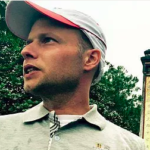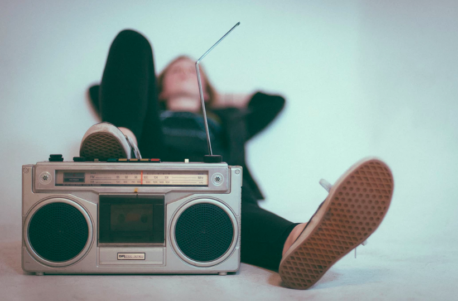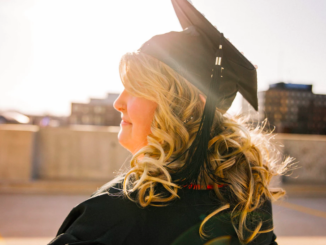
This article was published by David Lacy on The Bloggers Digest and on ipinionsyndicate
“What do we call visible light? We call it color. But the electromagnetic spectrum runs to zero in one direction and infinity in the other, so really, children, mathematically, all of light is invisible.” — Anthony Doerr, All the Light We Cannot See
When we were kids, my grandpa would take my brothers, me, and any cousins visiting town into the backyard to set up camp.
Beneath the tree fort we had built years prior (and modified numerous times, adding everything from a Slip-n-Slides’ water-slide, to a miniature perch of a second “level”), grandpa would zip the corners of the tent shut, and we’d wait in excited anticipation for what would come next. The last gleam of dusk would filter into the canvas as we shuffled into our sleeping bags, fluffed our pillows, and stared at the roof.
Grandpa was always full of new ideas, from carving out your cantaloupe to make room for a bowl of cereal, to pouring lighter fluid on the tip of a baseball bat and taking pictures as we stood above first base. I still recall the clerk at Long’s Drugs chuckling as he handed my grandfather the enveloped stack of prints. He must have gotten a kick out of the photos of grandkids swinging a bat so fierce that flames erupted.
This time he would simulate a rainstorm by moving in quick motions around the tent, shaking flashlights and rattling a large sheet of aluminum. Thunder and lighting would soon be joined with rain as he’d turn on a sprinkler just out of reach of our shelter, and we’d listen to the falling water alongside the rolling rumble. Soon we’d each pull out our own flashlights, casting both hand puppets and light sabers along the walls. It was far too early for sleep for a group of children who had just finished bowls of homemade ice cream we’d spent hours hand-cranking into existence.
We knew there was a carton of Baskin Robbins in the freezer; that just wasn’t the point.
I would always associate my grandfather with weather, even after he died in 1995, two weeks before I turned 15.
The drive across the salt flats in the pouring rain, the frantic wipers on the Datsun working overtime. The explosion of autumn colors at Sac State where he taught, an accounting professor with a monotone accountant’s drone, yet a surprisingly childish imagination. He once had my brother and I locate the “pineapple tree” amidst the fall fluorescence of elms, oaks, and coastal pines in the campus’ arboretum, using only a compass and my grandfather’s marching instructions.
We successfully located the six-pack of Dole miniature pineapple juices resting at the base of a stately oak.
My grandpa was nearly incapable of not helping someone in need. For decades he hadn’t failed to stop and check on a stranded motorist. He gave money to the homeless. He took us to drop clothes off at donation centers.
He knew we were watching his every move, and he took the responsibility seriously.
“Foot on the brake, look out your window, look out your side mirror, check your rearview,” he said to me and my brother, then only 8 and 7. He put the car into gear and narrated this as well. “Put it in first, check on your side again, look at the mirrors, press the accelerator.” He’d continue for a few more minutes, noting aloud the intricate attentions one must constantly pay while driving.
***
In the summer of 2016, I returned to Northern California after a ten-year (nearly-to-the-day) stint in Orange County. I had accepted a full-time job at Folsom Lake College and would be starting work in a few weeks and rented a home only a few miles from my grandparents’ old house.
The following autumn, my morning dog walker informed me that a homeless man had been sleeping on the other side of the chainlink fence, separating my property from a quiet real estate office and parking lot next door. The next evening, my ex-wife peered out a window and spotted a man sitting on the other side of the fence, shaded under a 10-foot canopy of bushes and trees.
I grabbed a cartridge of pepper spray and stomped into my backyard. Only six months prior we had had our fence clipped. The would-be thief had made little progress before my dogs began barking incessantly. He had attempted to break in and steal our lawn tools.
I actually had little concern for the rusty tools and used lawnmower. To be completely honest, if someone in need had asked me for them I probably would have just handed them over. I was only concerned for my dogs: the person had left a large hole in the fence, one from which my stealth husky could certainly escape. The thought of Ghost running into Fair Oaks Boulevard and being hit by a car forced a shudder through my body.
I purchased chain pieces and fixed the hole that same day. Livid, I kept my eye out for the attempted invader. I didn’t have to wait long. Driving home from work the following night, I saw a shadowy figure disappear into the canopied space on the other side of the fence. I parked in the driveway and ran to the spot. A tall, heavyset man was urinating just a little ways from a makeshift camp.
“Excuse me,” I shouted with more courage than I actually had.
The man zipped and stumbled drunkenly to face me. He looked weathered, ill — pathetic. Still, I was furious.
“You need to get the fuck away from my house before I call the police,” I threatened.
He raised his hands as if I were armed, and jumbled a half-coherent apology. I watched him gather his things and monitored him until he was clearly out of sight.
Newly-acquired pepper spray in hand, I was nervous and angry all over again. I approached this new camper from my side of the fence and demanded he admit his presence. It was too dark to see anything but forms and meek shadows.
“I’m not looking for any trouble,” a polite voice responded. “I’ve been sleeping back here the past few nights. I’m just looking for a place to sleep.”
I turned the flashlight of my phone on and cast the light through the links.
A man, maybe 50, sat, leaning against a tree. He was wearing a beanie, and two short rows of flattened cardboard stretched below his feet. A backpack, notepad, and plastic Starbucks water cup sat beside him. His own miniature flashlight rested in a bushes’ branch, next to his shoulder.
“I think the lady who walks your dogs saw me a couple days ago,” the voice on the other side of the fence offered preemptively. “I’ve stayed here only in the mornings and evenings the past few days. I leave during the day. I always clean up; I don’t do any hard drugs.”
He was answering the questions he’d clearly heard countless times before.
For the past year and a half, Warren has been my “neighbor.” A former professional painter and amateur musician, he had fallen on hard times. I will keep his story (much of which he has shared with me) private, but he has admitted to some of his own self-inflicted wounds in terms of re-establishing himself in a home and with work. Still, I also recognize the economic conditions in present-day America that make climbing back up extraordinarily daunting, yet making falling further one of the easiest things to do.
Warren is neat, tidy, and never causes a scene. The owner of the realtor’s office is aware of his presence and allows him to remain, so long as he packs up and leaves for the day before clients begin showing up. He’s also offered him food on more than one occasion.
This past summer, when I was dealing with a divorce, and stretched thin by bills I had been accustomed to paying with two incomes, Warren began bringing me Chinese food on a nightly basis. His EBT card had a limited hot food allowance, and while I insisted he not use it on me, he continued to drop off pork fried rice, chow mein, and cashew chicken regularly. A nearby restaurant loved Warren for the amount he spent there, and the owners began packing him extras to take “home” with him — extras he’d never fail to offer me. I began to give him lifts to run errands and eventually bought him a bike for greater mobility.
During our friendship, I learned that both his mom and uncle lived in Paradise. As I watched the news in horror this last Thursday, I waited for Warren to arrive for the evening so I could learn if he was aware of the situation. He was not. We were unable to reach his mom that evening, but the following morning he used my phone to contact her. She had been safely evacuated. They spoke for nearly 30 minutes, and when he handed the phone back over the fence, his eyes were wet with tears.
“She’s OK,” he whispered in a raspy voice. “She lost everything, but she’s ok. Sorry, just a little emotional talking to my mom.”
I got ahold of his sister (in Modesto) on Facebook and the two spoke later that same evening. Regardless of circumstances, Warren and his family still love each other tremendously. They too chatted for at least 30 minutes, while I prepared dinner for myself and the dogs.
As the sun set, smoke and ash began to creep into the valley. The sky was ablaze. I heard Warren say “good night,” to his sister.
***
On Saturday I bought some Christmas lights for the living room. A friend helped me drape the walls with them before we both sat down for a homemade meal of grilled cheese sandwiches and tomato bisque soup.
When we finished, we took the dogs into the yard to play. A dry breeze chilled the already freezing air, and we huddled, hands pocketed in our hooded sweatshirts, into a pair of folding camp chairs.
I stared at the thick layers of smoke surrounding us, pretending that winter’s fog had arrived early to the valley and that the smell was merely a campfire that offered no heat. My lab and husky chased each other in chaotic circles as I studied the overcast sky.
We sit below a heaven of ash.
Those words jolted my mind with a near-audible crack.
As the temperatures continued to drop, my friend and I looked at one another and came to a sudden and silent agreement. We returned to the house and began grabbing pillows and flashlights.
My backyard shed is tidy and virtually empty. We placed the pillows and flashlights inside it, and ran an extension cord from the house to the shed in order to set up a safe electric heater. (The shed is made of plastic rather than wood, and the modern heater was stationed away from any flammable items.)
I fell asleep on my couch that night, under the twinkling of the newly installed lights. My dogs annexed the remainder of the sofa, and soft music purred through a Bluetooth speaker I had neglected to shut off.
At some point, the CB radio Warren had loaned me months earlier crackled to life. It sat on the coffee table in front of me, sliding a bit across the hard wood with the vibrations of his voice.
“Hey David,” the staticky voice started. “I don’t know if you can hear this or not, but if you can, I just want you to know that I appreciate … all of this.”
I stared at the radio, frozen.
“I appreciate you letting me stay in here and I appreciate you.”
Silence. My lab propped her head up.
“Anyways, if you can hear this, I just wanted to say thank you.”
Crackle. Silence.
“Thank you for everything, David.”
I drifted back to sleep under a simulated crowd of glowing stars.
***
Warren, performing “Guitar Man,” a few years before becoming homeless





Be the first to comment